wikiHow is a “wiki,” similar to Wikipedia, which means that many of our articles are co-written by multiple authors. To create this article, volunteer authors worked to edit and improve it over time.
There are 10 references cited in this article, which can be found at the bottom of the page.
This article has been viewed 10,010 times.
Learn more...
Writing a character who has a mental disorder or illness, such as depression, PTSD, or a personality disorder, requires sensitivity. Many people who create characters with mental disorders do not take the time to ensure that the character is accurate and realistic. This article, on the other hand, can assist you in creating a character with a mental disorder.
Steps
Creating the Character
-
1Use “has a mental disorder/illness,” not “mentally ill.” The term "mentally ill" has a negative connotation because the person with a mental disorder/illness is still a person, not just a mental health condition. It can also be generally agreed that saying something like "Amira has bipolar disorder," is more respectful than saying "Amira is bipolar".[1] [2]
-
2Do your research. As much as you think you might know about a specific mental disorder, you must do research on the mental disorder before writing about the condition. Research is your best friend when writing about a character's mental disorder.[3] Research what the mental disorder is and how it's diagnosed, as well as symptoms of the mental disorder. Some great resources to research and understand mental health conditions are:
Tip: Make sure the resources you are using are up-to-date and accurate. It also makes a big difference if the resource has been viewed by an expert or professional.
Advertisement -
3Know what conditions are actually mental disorders. Make sure the "mental disorder" is actually a mental disorder. Some people mistake autism, ADHD, etc. as mental disorder when they aren't. This is also why research is important: if you think a certain condition or disability is a mental disorder when it isn't and you portray a non-mental disorder in your story, readers will likely be very offended (especially if they have a mental disorder or disability) or confused, at the least.[4] [5]
- Conditions that are not mental disorders: ADHD, autism, learning disabilities, intellectual disabilities.
- Conditions that are mental health conditions: depressive disorders, anxiety, schizophrenia, eating disorders, bipolar, paranoia, OCD, anxiety disorders, PTSD, DOD or DID disorders, and personality disorders.
Writing the Character
-
1Show how they act socially. They might try to avoid interacting with people altogether. They might be mute due to past trauma or extreme social anxiety. They might be very social and charming, but deceiving with their words. There could be one person who they specifically talk to and have a lot of trust with, but fear making new friends.
-
2Give them a background. Each character in a story has past moments that shape who they are in the present. Create an interesting background. For instance: a 23-year-old man named Aaron was sexually assaulted by his partner when he was 17. He felt weak and ashamed and refrained from telling anybody about the incident, so he kept it down. Throughout the story, he builds trust with a new partner and is encouraged by them to see a psychologist. He was diagnosed with PTSD at 22 and receives treatment later on.
- Try not to make their background too cliché. Do not romanticize mental disorders in your story: this is inappropriate and happens far too often in stories.
-
3Create the character, then apply the mental disorder. While a mental disorder is associated with a person, the character is more than just a mental disorder. Give them personality traits and an appearance before working on their mental disorder. You cannot simply create a character with a mental disorder and leave it at that. Everyone has a personality or traits that make up who they are. Create a character, not just someone who's has schizophrenia or bipolar disorder.[6] [7]
- Give them strengths and weaknesses. These are essential to make a character realistic and relatable. Ideally, they should have more strengths than weaknesses, or a fair amount of both.
- Create an appearance for them.
- Add in other details. Details that should be remembered when creating your character are their age, gender identity, and so on.
-
4Apply relevant challenges to their life. People with mental health conditions face many daily challenges, just like anyone else. You'll want to connect these challenges to the mental disorder you are giving your character to make them more accurate. This is also where research comes into play. When you thoroughly research a mental disorder, you also learn about challenges and symptoms associated with that condition.
- For example; many people with PTSD show avoidance by refusing to discuss to traumatic event(s) they experienced and isolating themselves from others. It's also likely that they will have reoccurring, unwanted thoughts about the event and what is to occur in the future.[8]
-
5Let the character have the mental health condition by the end of the story. Almost all mental health conditions cannot be cured. However, as mentioned earlier, they can be treated and people with mental health conditions mental disorders can lead great lives. The character with the mental health condition can go with or without treatment in your story, but shouldn't be "cured" at the end of the story.
-
6Allow them have positive times. When a character has a mental disorder, their life doesn't need to be dark, gloomy, and negative. Have them do positive things sometimes or let their life revolve around positive things with some negative moments. A character with anxiety for example, might spend most of their time by themselves overthinking, but when a friend invites them to play video games, they could accept.
Writing Respectfully
-
1Know what terms you shouldn't use to describe a character with a mental disorder. All language used to describe characters with mental disorder should be respectful and as neutral as possible. Using negative terms for mental disorders in your writing can offend readers with mental health conditions. If another character were to discuss the character with a mental disorder, you should avoid having terms like these used:[9] [10] [11]
- "Mental": Using the word "mental" to describe somebody with a mental disorder is offensive, derogatory, and dehumanizing.
- “Mentally disabled:” This is an outdated and offensive term to use that has been replaced with "mental illness" or "mental disorder".
- “Mentally ill:" Use "has a mental illness" instead of "mentally ill," as it's more respectful.
- "Mentally handicapped:" Handicapped is for someone that is physical differently-abled, not for somebody with a mental health condition.[12]
- "Mentally r*tarded:" This is an outdated term that has been replaced by "intellectual disability" or "developmental disability".
-
2Avoid stereotypes. Mental disorder is different for everybody. Despite this, there are many stereotypes writers will divert to when they know little about a mental disorder or don't have the mental health condition themselves. You've probably read or heard about stereotypes in stories with characters that have a mental disorder. Here are some to avoid creating in your story:[13]
- People with mental illnesses are violent. This is a widespread myth about people with mental illnesses. Many folks with mental disorder are actually not violent, crazy crime committers as the media portrays them to be. The truth is that a very small percent of people with mental disorder are violent and most people with mental disorder never commit crimes. They are actually more likely to be victims of violence than people without mental disorder are.
- People with mental disorder are incurable or there is no hope for them. Lots of people with mental disorder get treatment and can live amazing lives. While most mental disorder cannot be cured, they can be treated.
- People with mental disorder are unpredictable. While people with certain mental disorders might experience mood swings, extreme highs and lows or other symptoms doesn't mean they are unpredictable.
- People with mental disorder can't be trusted. Simply because somebody has a mental health condition doesn't automatically mean they aren't to be trusted or can't be trusted. Being untrustworthy is a personality trait, not a default for someone with a mental health condition.
-
3Avoid using insensitive terms. Insensitive terms dehumanize people with mental disorders and minimize them to their "habits" or behavior in a rude and unprofessional way. Readers with a mental disorder will more than likely be offended if insensitive language is casually used throughout the story. You don't want to include terms such as these to describe the character in your story: [14]
- "Crazy"
- "Junkie"
- "Psycho"
- "Deranged"
- "Insane/nuts"
Tip: You can have other story characters use one of these terms against the character with a mental disorder as long as the person insulting them is called out or gets reprimanded for it. Just don't describe a character with a mental disorder as "psycho" or a "drug junkie."
-
4Handle story deaths properly and respectfully. In real life and in fiction, people with and without mental disorder might murder someone, die by suicide, get murdered, or die unnaturally. However, characters with a mental disorder dying/killing need to be properly written to avoid stereotypes and prejudice:
- If the character dies of suicide, use the term "died by suicide" instead of "committed suicide" to have others talk about their death, because "committed suicide" makes suicide sound like a crime rather than a cause of death.
- If the character murders someone, make sure the feelings they have and their behavior is properly connected to their mental disorder Don't make the character murder somebody just because of the mental disorder they have: few people with mental disorder are actually serial killers or murderers.
- If the character is murdered specifically, have the other characters do something about this or show care. Don't have everyone forget about the person who died simply because they had a mental disorder or were "different". Have the murderer face criminal consequences.
- If a character in a story dies (not by murder), consider making another character without a mental disorder die. For example, if the person with a mental disorder was driving with somebody without a mental disorder and they both got in a severe car crash, consider having both of them die rather than just the character with the mental disorder.
Community Q&A
-
QuestionWhat if I want the character to be viewed negatively?
 NicoTop AnswererDo it in a way that isn't too biased. For example, don't make the character stereotypical and make them have an actual personality.
NicoTop AnswererDo it in a way that isn't too biased. For example, don't make the character stereotypical and make them have an actual personality.
References
- ↑ https://www.psychologytoday.com/us/blog/the-recovery-coach/201706/ten-commandments-how-talk-about-mental-health
- ↑ https://www.healthpartners.com/blog/mental-illnesses-terms-to-use-terms-to-avoid/
- ↑ https://medium.com/@MaryLouWrites/writing-about-mental-health-in-fiction-85e72e5199b1
- ↑ https://www.betterhealth.vic.gov.au/health/servicesandsupport/types-of-mental-health-issues-and-illnesses#dissociation-and-dissociative-disorders
- ↑ https://www.mayoclinic.org/diseases-conditions/mental-illness/symptoms-causes/syc-20374968
- ↑ https://www.psychologytoday.com/us/blog/the-recovery-coach/201706/ten-commandments-how-talk-about-mental-health
- ↑ https://www.writersandartists.co.uk/advice/writing-character-with-mental-health-condition
- ↑ https://www.verywellmind.com/requirements-for-ptsd-diagnosis-2797637
- ↑ https://www.writergirl.com/writing-about-mental-health/
- ↑ https://www.psychologytoday.com/us/blog/the-recovery-coach/201706/ten-commandments-how-talk-about-mental-health
- ↑ https://nda.ie/publications/attitudes/appropriate-terms-to-use-about-disability/
- ↑ https://nda.ie/publications/attitudes/appropriate-terms-to-use-about-disability/
- ↑ https://www.centennialmhc.org/wp-content/uploads/2017/12/Myths-and-Stereotypes-about-Those-with-MH-Disorders.pdf
- ↑ https://www.psychologytoday.com/us/blog/the-recovery-coach/201706/ten-commandments-how-talk-about-mental-health
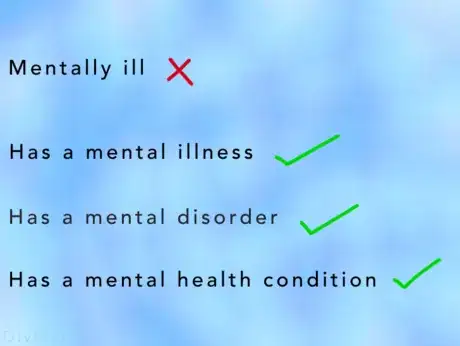

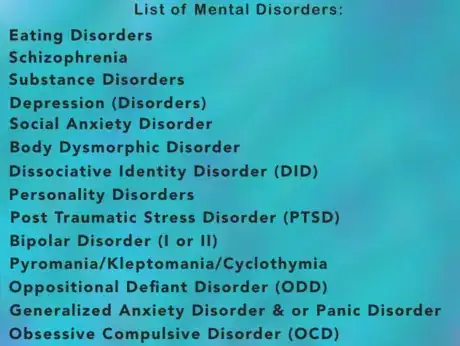
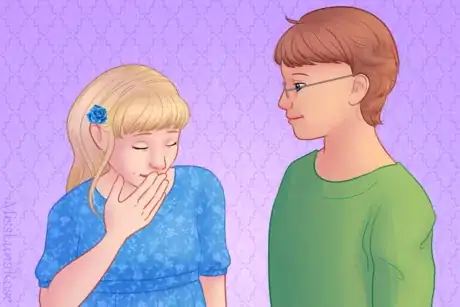

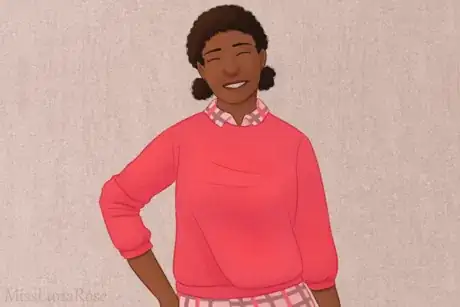
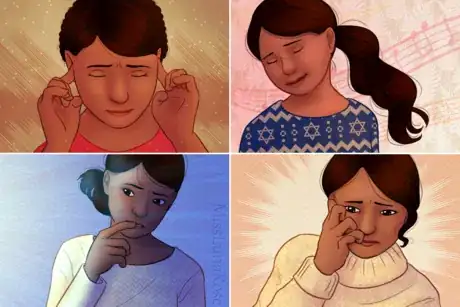
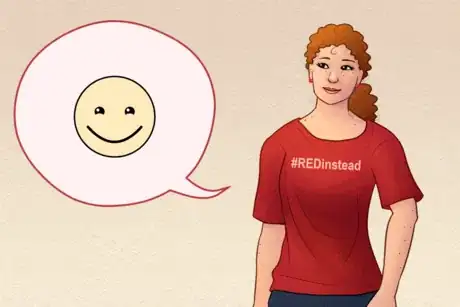
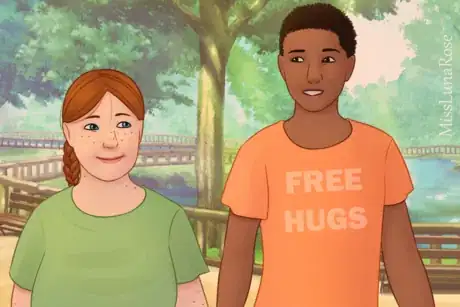
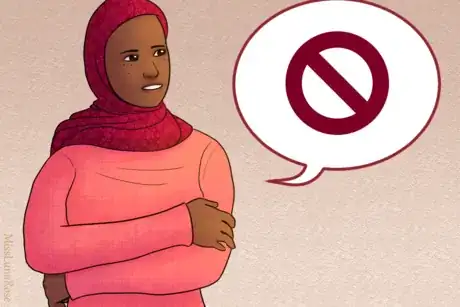

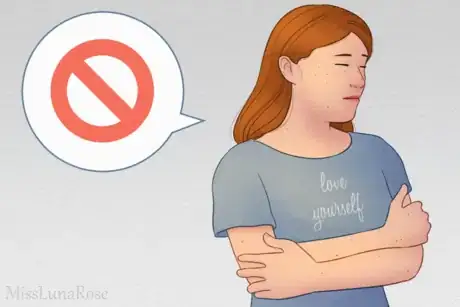


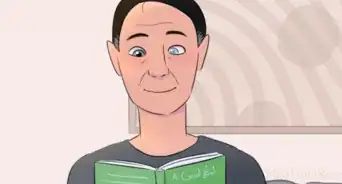







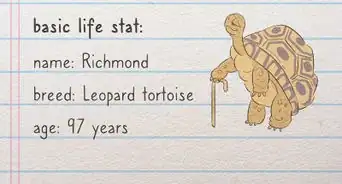











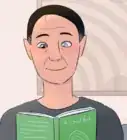





































Medical Disclaimer
The content of this article is not intended to be a substitute for professional medical advice, examination, diagnosis, or treatment. You should always contact your doctor or other qualified healthcare professional before starting, changing, or stopping any kind of health treatment.
Read More...